历史

Portrait of Archduke Albert VI of Austria, founder of the University.
Originally Albrechts University, the university started with four faculties (theology, philosophy, medicine and law). Its establishment belongs to the second wave of German university foundings in the late Middle Ages, like the Eberhard Karls University of Tübingen and the University of Basel. 建立于 by papal privilege (papal bull) the University in Freiburg actually was - like all or most universities in the Middle Ages - a corporation of the church body and therefore belonged to the Roman Catholic Church and its hierarchy. The bishop of Basel consequently was its provost or chancellor (Kanzler), the bishop of Constance was its patron while the real founder of the university was the sovereign, Archduke Albert VI of Austria, being the brother of Frederick III, Emperor of the Holy Roman Empire of the German Nation. At its founding, the university was named after Albert VI of Austria. He provided the university with land and endowments as well as its own jurisdiction. Also he declared Albrechts University as the "county university" (German Landesuniversität) for his territory until it was handed over to the Austrian House of Habsburg in 1490.
The University soon attracted many students as the humanists Geiler von Kaysersberg, Johann Reuchlin or Jakob Wimpfeling. When Ulrich Zasius was teaching law (until 1536), Freiburg became a centre of humanist jurisprudence. From 1529 to 1535 Erasmus of Rotterdam lived and taught in Freiburg. From around 1559 on, the university was housed at the Altes Collegium ("Old College"), today called the "new town-hall". The importance of the university decreased during the time of the Counter-Reformation. To counter reformatory tendencies, the administration of two faculties was handed over to the Roman Catholic order of the Jesuits in 1620. From 1682 on, the Jesuits built their college as well as the Jesuit church (nowadays the "University Church" or Universitätskirche).
The university had to move out of Freiburg several times, as from 1686 to 1698, when French troops occupied Freiburg and the southern parts of the upper Rhine region.
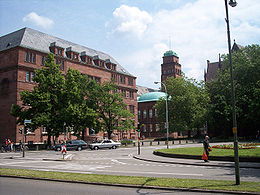
Kollegiengebäude I, erected in 1913 as main building of the university.
After Freiburg was re-conquered and appointed as capital of Further Austria, a new time began for the university by the reforms of Empress Maria Theresa of Austria. The requirements for admission were changed for all faculties in 1767 (before that time only Roman Catholics were allowed to study) and Natural Sciences were added as well as Public Administration. Also in 1767, the university became a governmental institution despite the Church's protests. The Church finally lost its predominant influence on the university when the Jesuits were suppressed following a decree signed by Pope Clement XIII in 1773. Consequently, Johann Georg Jacobi (brother of the more famous philosopher Friedrich Heinrich Jacobi) in 1784 was the first Protestant professor teaching at the university in Freiburg.
When Freiburg became a part of the newly established Grand Duchy of Baden (in German "Großherzogtum Baden") in 1805 (after Napoleon occupied the area of the formerly Further Austria), a crisis began for the university in Freiburg. Indeed there were considerations by Karl Friedrich, Grand Duke of Baden and Karl, Grand Duke of Baden to close down the university in Freiburg while both of them thought that the Grand Duchy could not afford to run two universities at the same time (the Ruprecht Karl University of Heidelberg also already existed since 1386). The university had enough endowments and earnings to survive until the beginning of the regency of Ludwig I, Grand Duke of Baden in 1818. Finally in 1820 he saved the university with an annual contribution. Since then the university has been named Albert Ludwigs University Freiburg (Albert-Ludwigs-Universität Freiburg) as an acknowledgement of gratitude by the university and the citizens of Freiburg.
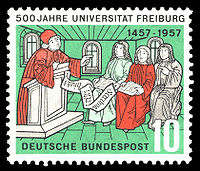
Postage stamp by Deutsche Bundespost to commemorate the university's 500th anniversary 1957
In the 1880s the population of the student body and faculty started to grow quickly. The scientific reputation of Albert Ludwigs University attracted several researchers like economist Adolph Wagner, historians Georg von Below and Friedrich Meinecke, or jurists Karl von Amira and Paul Lenel.
The University of Freiburg, among others, served as a role model for the establishment of Johns Hopkins University in Baltimore, USA, in 1875. Johns Hopkins was the first US university committed to research following Alexander von Humboldt's ideas of research as practiced at German universities at the time. Daniel Coit Gilman, founding president of Johns Hopkins, who had studied in Germany, visited Freiburg and other German universities in preparation for the founding of Johns Hopkins.
In 1900 Freiburg became the first German university to accept a female student. Just before World War I the university counted 3,000 students. After World War I the philosophers Edmund Husserl and (since 1928) Martin Heidegger taught at Albert Ludwigs University, as well as Edith Stein. On the field of social sciences, Walter Eucken developed the idea of ordoliberalism, which consequently is also known as the "Freiburg School".
In the beginning of the 20th century several new university buildings were built in the centre of Freiburg, such as in 1911 the new main building. During the "Third Reich" the university went through the process of "political alignment" (Gleichschaltung) like the rest of the German universities. Under the rector Martin Heidegger all Jewish faculty members were forced to leave the university in accordance with the "‘Law for the Reintroduction of Professional Civil Service". After World War II the university was re-opened. New buildings for natural sciences were erected in the Institutsviertel ("institute quarter").
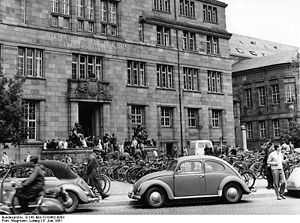
The University of Freiburg in 1961
In the postwar years, the ideas of ordoliberalism, developed earlier by economists of the Freiburg School such as Walter Eucken, Franz Böhm, Hans Grossmann-Doerth and Leonhard Miksch drove the creation of the German social market economy and its attendant Wirtschaftswunder. Nobel Prize winner and former professor at the University of Freiburg, Friedrich Hayek is also associated with this theory. He directed the Walter Eucken Institut, an economic think tank in Freiburg cooperating with the university. Arnold Bergstraesser, considered a founding father or German political science after World War II, was also a professor at the University of Freiburg. His research group later formed what is now the Arnold Bergstraesser Institute for socio-cultural research at the university.
In the late 20th century, the university was part of a mass education campaign and expanded rapidly. The student body grew to 10,000 by the 1960s, and doubled to 20,000 students by 1980. In the 1970s, the faculty structure was changed to 14 departments, with the Faculty of Applied Sciences becoming the 15th faculty in 1994. In 2002, the number of faculties was reduced to eleven. The university opened a memorial dedicated to the victims of National Socialism among the students, staff, and faculty in 2003.
In 2006, the University of Freiburg joined the League of European Research Universities (LERU). One year later, in 2007, the University of Freiburg was chosen as one of nine German Universities of Excellence.
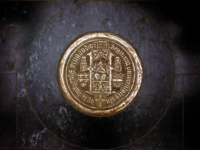
The university seal is set into the floor at the entrance of the largest lecture hall
auditorium maximum
University seal
The seal of the University of Freiburg depicts the educator Christ seated on a gothic throne holding the gospel in his right hand with the temple curtain in the background. Christ offers the teachings of the gospel to the Jewish scholars who are crouched at his feet. To the left and right of Christ are structures resembling towers, most likely symbolic of the Temple of Jerusalem. Located to the right of Christ is the coat of arms of the Austrian duchies, a banner with five eagles. The shield on the opposite side symbolizes the coat of arms used by the Habsburgs in conjunction with their territories. The coat of arms of the city of Freiburg is located at the bottom of the seal, displaying St George's Cross. The Latin inscription on the seal reads Sigillum universitatis studii friburgensis brisgaudie. The seal was slightly modified in 1913, but has otherwise been in continuous use since it was adopted in 1462.
校园
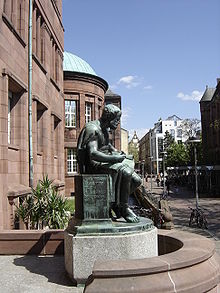
Aristotle, in front of the
Kollegiengebäude I
Having grown with the city since the 15th century, the university's buildings are deeply intertwined with the city. There are three large campuses (the university center next to the historical city center, the institutes quarter and the applied sciences campus), but other buildings can be found scattered throughout Freiburg.
The university complex in the historical center of Freiburg contains such picturesque buildings as the Jugendstil Kollegiengebäude I, built in 1911 by Hermann Billing, and the gothic revival old university library. The current University Library is also located in the historical center; it is a monumental building erected in the 1970s, and is to be renovated and redesigned beginning in September, 2008. It is one of the largest in Germany and placed 4 in an October, 2007 German national ranking of university libraries.
The University Church, located across from Kollegiengebäude II, was built in 1683 by the Jesuit order. The church and the Jesuit college were handed over to the university after the Jesuit order was suppressed in 1773. The church was destroyed in the November 27, 1944 bombing raid on Freiburg, and reconstructed in 1956.
The “institute quarter” (Institutsviertel) is home to the science faculties. This campus was destroyed almost completely in the Freiburg bombing raid in 1944. After World War II, the reconstruction of the institutes began. Today, the quarter houses the physics buildings, the tall main chemistry building, visible from afar, the famous Institute for Macromolecular Chemistry at the Hermann-Staudinger-Haus, various other science buildings, as well as the renowned pre-clinical institutes of the Faculty of Medicine.
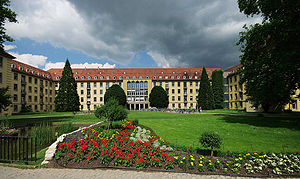
The
Department of Surgery at the University Medical Center.
The applied sciences campus is located next to the small Freiburg airfield to the northwest of the city center, close to the University Medical Center. The campus is home to the IMTEK (Institut für Mikrosystemtechnik, Department of Microsystems Engineering) and the Department of Computer Science. With the addition of the Faculty for Applied Sciences, the University of Freiburg became the first classical university to combine traditional disciplines with microsystems technologies.
The University Medical Center Freiburg (Universitätsklinikum Freiburg) is one of Germany's largest medical centers. It boasts 1,600 beds and handles 55,000 in-patients a year, with another 357,000 being treated ambulatorily. It consists of 13 specialized clinics, 5 clinical institutes, and 5 centers (e.g. Center for Transplantation Medicine). The University Medical Center achieved many technical advances, such as the first implantation of an artificial heart Jarvik 2000 (2002).
Most recently, the University of Freiburg purchased a large historic villa in the district of Herdern, which will house part of the literature and linguistics as well as history departments of the Freiburg Institute for Advanced Studies (FRIAS).
Students and Admission
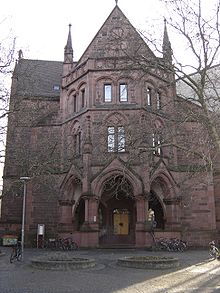
Kollegiengebäude IV, Humanities Faculty (Former University Library)
The university has a combined undergraduate and graduate student population of around 21,600. Approximately 16% of these students are foreigners, from ca. 120 different countries. The admission largely depends on the faculty and program applied for and is strictly merit based, with the average score of final secondary-school examinations (German Abitur) or A-levels playing an important role.
The University of Freiburg offers a large variety of undergraduate, graduate, and postdoctoral degree programs at its eleven faculties in 150 fields of study.
As common among German universities, the academic year consists of summer and winter terms (semesters). The winter term runs from October 1 to March 31, while the summer term runs from April 1 to September 30. However, lectures and classes usually do not run for the full duration of these periods and allow for breaks in spring and fall.
German universities enjoy government subsidies, so tuition fees are moderate. The University of Freiburg charges EUR 1210 per year for all undergraduate and most graduate and doctoral programs, regardless of the EU or non-EU citizenship of students.
Student life
There are numerous student clubs and organizations, among them a student-run radio station, echo-fm, and a student television program, alma*, which is also available as a podcast. Because of the nearby French and Swiss borders and the adjacent Black Forest, where the university owns a retreat on Schauinsland Mountain, there are fine opportunities for leisure and outdoor activities.
The university provides student housing in its various dormitories, run by the Stundentenwerk. Additionally, there are further dormitories in Freiburg which are operated by other institutions, such as the Catholic Archdiocese or the Evangelical Church. Due to the affordable rent and limited spots, rooms in the various dormitories are very popular. Many students find private living arrangements, such as Wohngemeinschaften (shared apartments). However, the popularity of Freiburg for prospective students can make finding an apartment or room quite time consuming, especially before the start of the academic terms.
The university has its own career center, singled out as one of the best in Germany by the Stifterverband für die Deutsche Wissenschaft.
Academic and Current Affairs
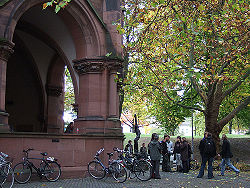
Kollegiengebäude IV Entrance
In university rankings published by German magazines and periodicals (Der Spiegel, Die Zeit, Focus, etc.) the University of Freiburg has established itself as one of Germany's top universities. The faculties for law, medicine, economics, history, English studies, biology, dentistry, and pharmacology achieve especially high scores. In regards to the natural sciences, the University of Freiburg ranked 6 in Europe and 2 in Germany in a ranking of the European Commission of the universities according to their overall impact on scientific research.
The university scored well with its submissions to the German Universities Excellence Initiative. The university received funding in all three categories. In the first category, funding for a new graduate school, the Spemann Graduate School of Biology and Medicine, was granted; in the second, funding was granted for the excellence cluster Centre for Biological Signalling Studies (bioss); and in the third category, Institutional Strategy Line of Funding, open only to institutions with submissions qualified in the first two categories, the university is receiving funding for "Windows for Research", which aims to promote a high level of interdisciplinarity between research fields and attract scientists from all over the world. To that end, the university founded the Freiburg Institute for Advanced Studies (FRIAS). Being selected for the third category ranks Freiburg as one of nine "excellence universities" in Germany. The University is to receive over Euro 130 million in additional funds over five years (from 2007) from this third category funding. In 2009, the University was successful in a nationwide competition for excellence in teaching, held by the Stifterverband der deutschen Wissenschaft. The University of Freiburg, with its plans for future innovative teaching concepts, was selected as one of ten winners from a field of over one hundred higher education institutions.
In 2007, the Albert Ludwigs University celebrated its 550 anniversary with a wide range of events that took place throughout the year.
Teams of the University of Freiburg frequently participate in academic competitions with considerable success. The moot court team of the Faculty of Law has already won the Willem C. Vis International Commercial Arbitration Moot twice. The humanoid robot team of the Faculty for Applied Sciences regularly competes with distinction in international tournaments. The University of Freiburg team has also repeatedly scored highly at the iGEM undergraduate synthetic biology competition held at the Massachusetts Institute of Technology. The team was supported by numerous university institutions, among them the recently established bioss cluster of excellence. The University of Freiburg also participates in the National Model United Nations (NMUN) held annually in New York City, NY.
The genetically engineered golden rice was developed by the University of Freiburg and the ETH Zurich from 1992 to 2000. It was considered a breakthrough in biotechnology at the time of publication and now helps to provide Vitamin A to people lacking access to it in their diet.
When previous rector Prof. Dr. Jäger retired in 2008, law professor Prof. Dr. Andreas Voßkuhle was chosen as his successor. However, shortly after the start of his term, the Social Democratic Party of Germany (SPD) nominated Voßkuhle as vice-president of the Federal Constitutional Court of Germany. Voßkuhle accepted the nomination, was confirmed and took his seat on the court in May 2008. In July 2008, then vice-rector Prof. Dr. Hans-Jochen Schiewer was elected as successor to Voßkuhle. Schiewer has assumed the position of rector with the start of the winter term 2008/2009.
The University of Freiburg offers educational audio and video content on the iTunes U software platform since January 2008.
Organization and Faculties
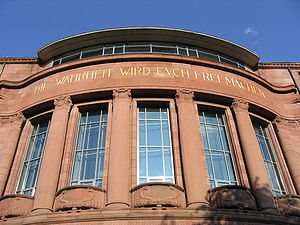
"Die Wahrheit wird euch frei machen" (The truth will make you free).
Today, at the university there are about 430 professors, 3,695 academic employees and 8,644 non-academic employees working for the Albert Ludwigs University, making it Freiburg's and the region's biggest employer. The university attracts many academics from abroad and was awarded excellent positions in the 2005 and 2009 Humboldt Ranking,.
Faculties
The university is headed by a rector and divided into 11 faculties:
| Faculty of Theology |
网址 |
| Faculty of Law |
网址 |
| Faculty of Medicine |
网址 |
| Faculty of Economics and Behavioural Sciences |
网址 |
| Faculty of Philology |
网址 |
| Faculty of Philosophy (history, sociology, etc.) |
网址 |
| Faculty of Mathematics and Physics |
网址 |
| Faculty of Chemistry, Pharmacy and Geo-sciences |
网址 |
| Faculty of Biology |
网址 |
| Faculty of Forest and Environmental Sciences |
网址 |
| Faculty of Engineering |
网址 |
Graduate Schools
The University of Freiburg has a variety of graduate education and research opportunities. In an evaluation of European graduate programs, Freiburg was ranked among the "excellence group" in several subject fields examined (economics, biology, psychology).
One of the notable graduate opportunities is the Freiburg Institute for Advanced Studies (FRIAS), a project funded by the German Excellence Initiative.(see Current affairs and academics above)
Apart from the many graduate programs of its faculties, Freiburg has set up additional specialized graduate schools and graduate research centers, coordinated by the newly founded International Graduate Academy (IGA) Freiburg. The IGA coordinates five Graduate Schools: the Spemann Graduate School of Biology and Medicine (SGBM); the European Cultures and Intercultural Interweaving school; the Theology and Religious Studies school; the Hermann Paul School of Language Sciences and the Environment, Society and Global Change graduate school of the Faculty of Forest and Environmental Sciences.
The IGA also coordinates twelve Graduate Research Centers (Graduiertenkolleg): Biochemistry of Enzymes; Friends, Patrons, Clients; Formation and Development of Present-Day Landscapes; Mathematical Logics and Applications; Mechanisms of Neuronal Signal Transduction; Catalysts and Catalytic Reactions for Organic Synthesis (in cooperation with the University of Basel); Hadron Collider Physics; Embedded Microsystems; From Cells to Organs: Molecular Mechanisms of Organogenesis; Signal Systems in Model Organisms of Plant Origin; Micro Energy Harvesting; and PhD program Computational Neuroscience at the Bernstein Center for Computational Neuroscience Freiburg
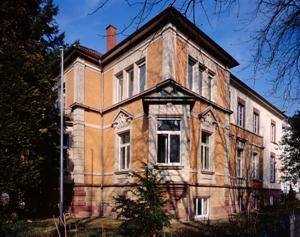
FRIAS School of History Building, Stadtstrasse 5.
Finally, the university operates three joint graduate schools with the Max Planck Society: the International Max Planck Research School for Molecular and Cellular Biology; the International Max Planck Research School on Retaliation, Mediation and Punishment; and the International Max Planck Research School for Comparative Criminal Law.
Together with the EUCOR universities of Basel and Strasbourg and the Karlsruhe Institute of Technology, the University of Freiburg also runs the shared graduate school Ecole Supérieure de Biotechnologie de Strasbourg, enabling the students to obtain an international degree in biotechnology and a trilingual education, as classes are taught in English, German, and French.
International language courses
The University of Freiburg has offered German language courses for foreign students since 1911. The courses take place at the university's Language Teaching Centre (Sprachlehrinstitut, SLI) during the semester breaks and attract students from over 50 nations to Freiburg. The intensive language lessons are bolstered by a supplementary program with lectures and seminars on German culture, politics, philosophy, and art as well as excursions to the Black Forest, the Alsace region in France, Basel (Switzerland) or Lake Constance. In addition to classes for all language levels, professional German courses (e.g. Business German) are also offered.
Sustainability
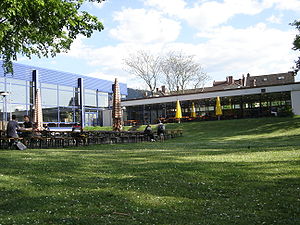
The green at the central
mensa (cafeteria) on Rempartstraße
The city of Freiburg is known for its environmentally friendly policies and focus on renewable energy and sustainability, attracting solar industry and research to the city. This environmentally conscious attitude also extends to the University of Freiburg which has founded the work group "Nachhaltige Universität Freiburg" (Sustainable University of Freiburg) and has drawn up environmental guidelines to be implemented in university practice.
The university has also founded the initiative Solar-Uni Freiburg in 2007, with the aim of further expanding its capabilities in sustainability and environmental research. Solar panels were installed on the roofs of university buildings. To bundle renewable energy research and teaching at the university, the Center for Renewable Energy (ZEE, Zentrum für Erneuerbare Energien), an interdisciplinary and cross-faculty facility, was founded. Aside from research in the fields of solar energy, biomass, geothermal energy, energy efficiency and new energies, an international Master of Science degree in Renewable Energy Management is being offered.
In addition to its own expertise, the Center for Renewable Energy can draw upon the support of the renewable energy industrial sector in Freiburg, as well as the university's cooperation with other research institutes in the area, such as the Fraunhofer Institute for Solar Energy Systems, the Öko-Institut - Institute for Applied Ecology, or the University of Applied Sciences Offenburg.
University cooperation
Local partner institutions
The University of Freiburg cooperates closely with external research institutions located in Freiburg, several of which are connected with chairs at the university.
Collaborating institutions include:
- the Leibniz-Gemeinschaft Kiepenheuer-Institut für Sonnenphysik
- the Bernstein Center Freiburg
- the Max Planck Institute for Immunobiology
- the Max Planck Institute for Foreign and International Criminal Law
- the Max Planck Institute for Chemistry, Fire Ecology Research Group
- the Arnold Bergstraesser Institute for Socio-Cultural Research (ABI)
|
- the Fraunhofer Institute for Applied Solid-State Physics
- the Fraunhofer Institute for High-Speed Dynamics (Ernst-Mach-Institut)
- the Fraunhofer Institute for Physical Measurement Techniques
- the Fraunhofer Institute for Solar Energy Systems
- the Fraunhofer Institute for Mechanics of Materials
- the Confucius Institute
|
International cooperation

The Institute for Medical Ethics and History of Medicine and the Institute for Biostatistics and Medical Informatics at the Faculty of Medicine.
The university is part of the regional EUCOR federation together with the universities of Basel, Mulhouse, and Strasbourg and the Karlsruhe Institute of Technology; the League of European Research Universities; the European University Association; ASEA-Uninet; AC21; and the International Forum of Public Universities (IFPU). The university also has exchange agreements and cooperative efforts with renowned universities on almost every continent.
The University of Freiburg initiated an English language international master's program in social sciences, the Global Studies Programme (GSP) in 2001. The aim of the program is to enable students to study social sciences in different regions and cultures. Combining various disciplines such as sociology, political sciences, anthropology and geography, students approach globalization with a unique perspective. The program is conducted jointly by the University of Freiburg with the University of KwaZulu-Natal in Durban, South Africa, the Jawaharlal Nehru University in New Delhi, India, the 拉丁语 American Social Sciences Institute in Buenos Aires, Argentina, and the Chulalongkorn University in Bangkok, Thailand. Students in the GSP master's program study on three different continents during the two-year degree program. Since 2008, the GSP also offers a PhD program in Global Studies. The Global Studies Program has received many awards, among them the BMW Group Award for Intercultural Learning in 2004 as well as being listed a Top Ten International Master's Degree Course in Germany by the German Academic Exchange Service (DAAD) in 2006.
The university also supports the Institute for Russian-German Literature and Cultural Relations at the Russian State University for the Humanities as well as the Vladimir Admoni School for Doctoral Studies at the University of Latvia.
Notable Alumni and Professors
Perhaps best known amongst the alumni of the university are Hannah Arendt, Edmund Husserl, Martin Heidegger, Paul Ehrlich, Hans Adolf Krebs, Hans Spemann, and Friedrich August von Hayek.
Among the affiliates are numerous Nobel laureates and Leibniz Prize winners.
For a complete list of notable alumni and professors, see: People associated with the University of Freiburg
|
|
|
|
|
|
|
|
|
|
|
|
|
|
|
|
|
|
|
Adolf Otto Reinhold Windaus
|
更多
- University Medical Center Freiburg
- Freiburg Institute for Advanced Studies
- University Church, Freiburg
- Freiburg im Breisgau
- Freiburg School of Economic Thought
External links
- Albert Ludwigs University of Freiburg
- University of Freiburg Student Portal
- Freiburg Institute for Advanced Studies
- University of Freiburg Alumni
- University Library
- University Medical Center Freiburg
- Freiburg University store
参考文献
- ^ Freiburg University Statistics Page (de). [1]
- ^ "Downsizing and Specialising: The University Model for the 21st Century?" (PDF). Third European Report on Science & Technology Indicators 2003. European Commission. February 2004. ftp://ftp.cordis.europa.eu/pub/indicators/docs/3rd_report_snaps10.pdf. Retrieved 2008-08-14.
- ^ League of European Research Universities. [2]
- ^ Albert-Ludwigs-Universität Freiburg (2007) "Mission statement of the University of Freiburg" [3]
- ^ Janes, Jackson (2004) (PDF). A spirit of reason - Festschrift for Steven Muller. Washington, D.C.: American Institute for Contemporary German Studies. pp. 15. ISBN 9780941441889. OCLC 179735617. http://www.aicgs.org/documents/muller.pdf.
- ^ "Memorial for the Victims of National Socialism among the Students, Staff, and Faculty of the University of Freiburg". Albert-Ludwigs-Universität Freiburg. 2008-01-21. http://www.uni-freiburg.de/en/universitaet/mahnmal/index.php. Retrieved 2008-08-21.
- ^ http://www.uni-freiburg.de/en/universitaet/geschichte/unisiegel.php?
- ^ "Home page" (in German). Universitätsibliothek. Albert-Ludwigs-Universität Freiburg. http://www.ub.uni-freiburg.de. Retrieved 2008-08-21.
- ^ Federkeil, Gero (October 2007) (in German) (PDF). CHE-Ranking Die Universitätsbibliotheken für Geisteswissenschaften aus Sicht der Studierenden. Gütersloh: CHE Centrum für Hochschulentwicklung. ISBN 9783939589594. OCLC 187988798. http://www.che.de/downloads/IIB_Bibliotheken.pdf. Retrieved 2008-08-21.
- ^ "Über die Unikirche" (in German). Albert-Ludwigs-Universität Freiburg. December 1989. http://www.universitaetskirche.uni-freiburg.de/pages/unik.htm. Retrieved 2008-08-21.
- ^ Freiburg University Statistics Page (de). [4]
- ^ See more at "The Information and Service Platform". Albert-Ludwigs-Universität Freiburg. http://www.studium.uni-freiburg.de/index_html-en-en/view?set_language=en. Retrieved 2008-08-29.
- ^ "echo-fm 88,4" (in German). Albert-Ludwigs-Universität Freiburg. http://www.echo-fm.uni-freiburg.de. Retrieved 2008-08-27.
- ^ "New Media Center der UB / uni.tv" (in German). Albert-Ludwigs-Universität Freiburg. http://www.uni-tv.uni-freiburg.de. Retrieved 2008-08-27.
- ^ Albert-Ludwigs-Universität Freiburg (2007-11-22). "Universität Freiburg erneut an der Spitze" (in German). Press release. http://www.pr.uni-freiburg.de/pm/2007/pm.2007-11-22.391. Retrieved 2008-08-27.
- ^ "ForschungsRanking deutscher Universitäten" (in German). CHE Centrum für Hochschulentwicklung. http://www.che.de/cms/?getObject=260&getName=Projekte+alphabetisch&strAction=show&PK_Projekt=172&getLang=. Retrieved 2008-08-29.
- ^ "FOCUS-Uniranking 2007" (in German). Focus. http://www.focus.de/wissen/campus/hochschulen. Retrieved 2008-08-29.
- ^ Berghoff, Sonja; Federkeil, Gero; Giebisch, Petra; Hachmeister, Cort-Denis; Hennings, Mareike; Müller-Böling, Detlef (February 2008) (in German) (PDF). Das CHE-ForschungsRanking deutscher Universitäten 2007 - Arbeitspapier Nr. 102. Gütersloh: CHE Centrum für Hochschulentwicklung. ISBN 9783939589679. http://www.che.de/downloads/CHE_ForschungsRanking_2007_AP_102.pdf.
- ^ Zimmermann, Thomas. "Medizinische Fakultäten: Der Ausbildungserfolg im Vergleich (I)" (in German). Uni/Beruf - Artikel. aerzteblatt-studieren.de. http://www.aerzteblatt-studieren.de/doc.asp?hl=x&docid=103447. Retrieved 2008-08-29. and van den Bussche, Hendrik. "Medizinische Fakultäten: Der Ausbildungserfolg im Vergleich (II)" (in German). Uni/Beruf - Artikel. aerzteblatt-studieren.de. http://www.aerzteblatt-studieren.de/doc.asp?hl=x&docid=103819. Retrieved 2008-08-29.
- ^ Young Germany: The New "Elite Universities"
- ^ Site - German Universities Are Among The Best In Europe
- ^ Albert-Ludwigs-Universität Freiburg (2007-10-19). "Excellence Initiative: University of Freiburg Qualifies for Champions League". Press release. http://www.pr.uni-freiburg.de/pm/2007/pm.2007-10-19.352. Retrieved 2008-08-29.
- ^ "Excellence Initiative - University of Freiburg". Albert-Ludwigs-Universität Freiburg. http://www.exzellenz.uni-freiburg.de/welcome.html/view?set_language=en. Retrieved 2008-08-29.
- ^ Albert-Ludwigs-Universität Freiburg (2009-10-19). "EHumboldt Would Study in Here: University of Freiburg Wins National "Excellent Instruction" Competition". Press release. http://www.pr.uni-freiburg.de/pm/2009/pm.2009-10-19.364/. Retrieved 2009-10-20.
- ^ "Hockeyroboter sind Weltmeister". http://www.pr.uni-freiburg.de/pm/2009/pm.2009-07-06.256/?searchterm=Hockey. Retrieved 2009-11-20.
- ^ http://2008.igem.org/Jamboree/Results
- ^ Alexander von Humboldt Foundation (2006-05-24). "Humboldt Rankings: Germany's most internationally attractive universities". Press release. http://www.humboldt-foundation.de/en/aktuelles/presse/pn_archiv_2006/2006_11.htm. Retrieved 2008-08-26.
- ^ Alexander von Humboldt Foundation (2009-06-02). "Humboldt-Ranking: Welche sind die international attraktivsten Universitäten Deutschlands?" (in German). Press release. http://www.humboldt-foundation.de/web/1083580.html. Retrieved 2009-06-02.
- ^ Albert-Ludwigs-Universität Freiburg (2007-11-29). "CHE-ExcellenceRanking: Universität Freiburg eine der Topadressen für den Forschernachwuchs" (in German). Press release. http://www.pr.uni-freiburg.de/pm/2007/pm.2007-11-29.396. Retrieved 2008-08-29.
- ^ "CHE ExcellenceRanking English". CHE Centrum für Hochschulentwicklung. http://www.excellenceranking.org. Retrieved 2008-08-29.
- ^ "A brief portrait of the University of Freiburg". Albert-Ludwigs-Universität Freiburg. http://www.uni-freiburg.de/en/universitaet/kurzportrait.php. Retrieved 2009-08-11.
- ^ http://www.daad.de/deutschland/studienangebote/international-programmes/07535.en.html?ipid=1047&iplevel=&ipterm=&ipterm2=&ipfield=&ipsubject=&iptypehei=&iptownhei=Freiburg&iphei=&iplangdistribution=&iplangtest=&iptuitionfees=&ipjointdegree=&ipparttime=&ipfasttrack=&ipcombined=&ipduration=



